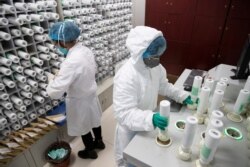There is no set definition for a pandemic, but there is growing consensus among health care specialists that the world is presently facing a coronavirus pandemic.
Yet, the World Health Organization (WHO) has refrained from calling it a pandemic and maintains that the present outbreak of the new coronavirus that causes COVID-19 qualifies as a “public health emergency of international concern.” On Monday, WHO Director-General Tedros Adhanom Ghebreyesus said “the threat of a pandemic has become very real” with the continued spread of the disease.
Dr. Eric Toner, a Johns Hopkins University scholar on health security, believes the WHO is trying to contain any panic that may result from the term “pandemic,” but in his view, there is no denying the facts and the magnitude of the problem:
“This disease is on every continent. It's in most countries now and it is spreading person to person in many, many countries around the world. And so, by any, in my view, by any reasonable definition, this is a pandemic,” Toner said.
Why the experts believe it’s a pandemic
Toner believes that this is the beginning phase of a pandemic.
“There is no completely agreed-upon definition of a pandemic, but it means that all people are at risk of an infectious disease that is spreading around the world. And certainly by that definition, we are in a pandemic.”
What that implies is that the number of confirmed cases will continue to rise with growing impact on the global health infrastructure as well as the economy and society, the physician he said.
Spread of the disease
Experts believe that everybody is susceptible to the infection. Cases identified in most countries, in virtually every corner of the planet, suggest that no particular group or population has an inherent immunity to the virus. As testing expands, public health officials expect to see new pockets of infection.
“In much of Africa until very recently, they had no access to testing. So, there was no possibility of finding cases. I think now as test kits are becoming available in Africa, we will see many more cases in Africa not because it has just started spreading but because now we are able to see it,” Toner said.
While some age groups face higher risk for death or severe complications, the disease does not spare anyone. It is now clear that children can also be infected, he said.
Toner believes that sweeping measures, such as those taken in China, help to suppress the disease, but experience with similar viruses has shown that it is impossible to stop such viruses until there is a vaccine against the infection.
“We have never been able to stop the spread of a contagious respiratory virus. We can't stop flu. We can't stop the common cold. We can't stop other viruses that pass in this way. And there's no evidence that we can that we can really stop this,” he said.
What public health authorities should focus on, he says, is being prepared for the further spread of the disease, which will stress health systems and resources.
Will pandemic lead to panic?
As experts try to understand the pathogen, they have also had to fight back against false science. Much has been said about the potential that the disease will respond to rising temperatures, which will result in reduced rates of infection. President Trump repeated the theory by stating “in April, when it gets warm — historically, that has been able to kill the virus.”
Toner said that nobody, not even health officials, can make informed statements about the COVID 19 virus because it is still a new pathogen.
“We know nothing about this virus. It's a brand new virus," he said. "And we don't know whether we can extrapolate from what we know about other coronaviruses.”
He stresses that there is little hope in reduced rates of infection because of the warming weather.
“With this virus, in Singapore, for example, in Hong Kong, in Vietnam, it's warm and humid this time of year and viruses still seems to be transmitting just fine. It seems to be transmitting just fine in other countries that are relatively warm, so it's transmitting in places that are hot, places that are cold. I would not bet that it's going to taper off in the summertime,” Toner said.
Looking forward he stresses that common sense measures remain the most effective protection from the infection, both for individuals and society as a whole.
“Social distancing works, that if people can avoid crowded places, they can avoid direct face-to-face contact within 3 feet (1 meter) of a person who is sick, that can reduce your risk of spreading the disease," he said. "Probably the most important, single most important thing is for people who are sick to stay home and in order for them to do that they need to be paid because otherwise, most people have to go to work.”
As communities learn to adapt to the spread of this new public health threat, and authorities implement measures to control, track and respond to the disease, the ultimate solution will come with a vaccine to prevent infections. Scientists are hard at work studying the virus, but a vaccine is months, maybe years away, Toner said.
“The most rosy scenarios are that we would have a vaccine in 12 to 18 months. But that would be unprecedented. We've never been able to do that for a vaccine before,” he said.
Health experts stress that most of the people affected by the disease will experience mild to moderate symptoms, similar to the common cold, with low to no risk of death.
“It's a small fraction of people who get seriously ill, who develop pneumonia from it, and a fraction of those people who become critically ill and some who die,” Toner said.
The expert sees significant systemic challenges ahead, on the health care system, the economy and the education system, as people are forced to stay home because of sickness or imposed quarantine.
In times of worry, the expert believes that facts provide the best reassurance.
“I think the antidote to panic is truth and transparency,” Toner said.







